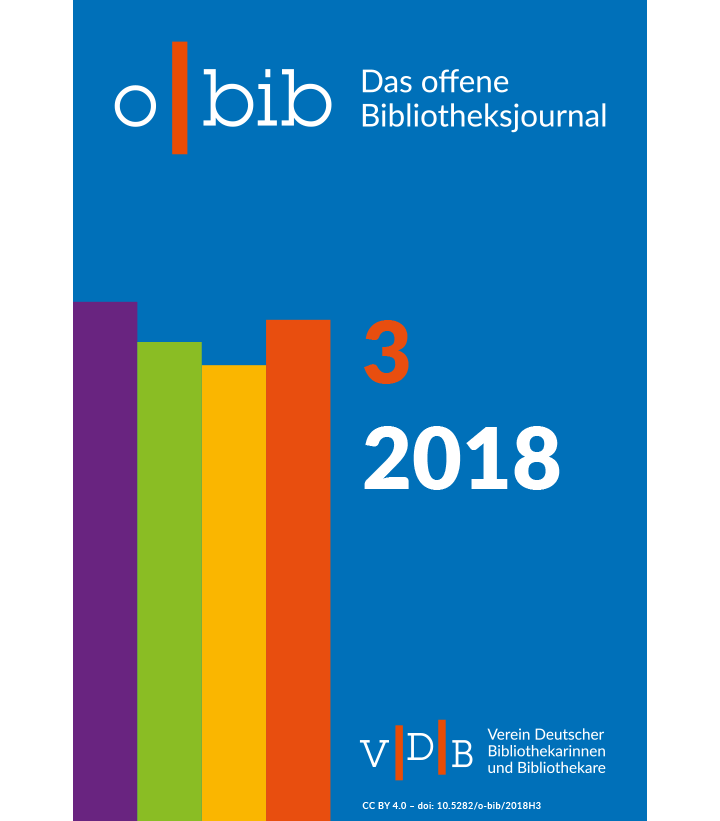Anforderungen der Ingenieurwissenschaften an das Forschungsdatenmanagement der Universität Stuttgart - Ergebnisse der Bedarfsanalyse des Projektes DIPL-ING
DOI:
https://doi.org/10.5282/o-bib/2018H3S46-60Keywords:
Forschungsdatenmanagement, Ingenieurwissenschaften, RepositorienAbstract
The importance of research data as the basis of all scientific reasoning is not always reflected in their management. Particularly in the engineering disciplines there is a backlog demand in research data management to make data reusable, reproducible and verifiable. The following publication summarizes the outcomes of the requirement analysis conducted for the project DIPL-ING. This project aims to deliver concepts for data management in infrastructures, processes and life cycles in engineering. By means of concrete use cases from the fields of technical thermodynamics and aerodynamics, problems and requirements of engineering disciplines were identified and addressed. Specific requirements result from the fact that the research in these fields is mainly based on software and code which produce huge amounts of raw and analyzed data. To facilitate reasonable reuse, either internally or externally, discipline-specific metadata standards are needed to document the provenance of data and codes and ensure the retrieval as well as the comprehensibility of the data. In addition, there is a lack of discipline-specific guidelines recommending which part of the data should be archived and for what period of time. The publication of data requires infrastructures that can handle large volumes of data as well as software code and provide quality and access control.
References
Data Cite Metadata Working Group. 2017. DataCite Metadata Schema for the Publication and Citation of Research Data. Version 4.1. DataCite e.V. http://dx.doi.org/10.5438/0015.
DFG. 2015. „Leitlinien zum Umgang mit Forschungsdaten.“ Technischer Bericht (Deutsche Forschungsgemeinschaft, 2015). Zuletzt überprüft am 16.02.2018, http://www.dfg.de/download/pdf/foerderung/antragstellung/forschungsdaten/richtlinien_forschungsdaten.pdf.
DKRZ, „Cerasearch“, zuletzt geprüft am 05.01.2018, https://cera-www.dkrz.de/WDCC/ui/cerasearch/.
Joo, Yeon Kyoung, und Youngseek Kim. 2017. „Engineering researchers’ data reuse behaviours: a structural equation modelling approach.“ Herausgeber: Emerald Publishing Limited. The Electronic Library 35 (6): 1141-1161. http://dx.doi.org/10.1108/EL-08-2016-0163.
Krüger, Jens, Richard Grunzke, Sandra Gesing, Sebastian Breuers, André Brinkmann, Luis de la Garza, Oliver Kohlbacher, et al. 2014. „The MoSGrid Science Gateway – A Complete Solution for Molecular Simulations.“ Journal of Chemical Theory and Computation 10 (6): 2232-2245. http://dx.doi.org/10.1021/ct500159h.
Kumar, Anand, Vladimir Grupcev, Meryem Berrada, Joseph C. Fogarty, Yi-Cheng Tu, Xingquan Zhu, Sagar A. Pandit, und Yuni Xia. 2014. „DCMS: A data analytics and management system for molecular simulation.“ Journal of Big Data 2 (1): 9. https://doi.org/10.1186/s40537-014-0009-5.
Lautenschlager, Michael, F Toussaint, Hannes Thiemann, und Manfred Reinke. 1998. „The CERA-2 data model.“ The CERA-2 data model. ), zuletzt geprüft am 07.02.2018, https://www.pik-potsdam.de/cera/Descriptions/Publications/Papers/9807_DKRZ_TechRep15/cera2.pdf.
Malik, Tanu. 2014. „Geobase: Indexing NetCDF Files for large-scale Data Analysis.“ In Big Data Management, Technologies, and Applications, 295-313. IGI Global. Zuletzt geprüft am 15.02.2018, http://dx.doi.org/10.4018/978-1-4666-4699-5.ch012.
Meneveau, Charles, und Ivan Marusic. 2017. „Turbulence in the Era of Big Data: Recent Experiences with Sharing Large Datasets.“ In Whither turbulence and big data in the 21st century?, Herausgeber: Andrew Pollard, Luciano Castillo, Luminita Danaila und Mark Glauser, 497-507. Switzerland: Springer. http://dx.doi.org/10.1007/978-3-319-41217-7.
Reilly, Susan, Wouter Schallier, Sabine Schrimpf, Eefke Smit, und Max Wilkinson. 2011. „Report on integration of data and publications.“ Report on integration of data and publications. Zuletzt überprüft am 16.02.2018, http://epic.awi.de/31397/1/ODE-ReportOnIntegrationOfDataAndPublications-1_1.pdf.
Schembera, Björn, und Thomas Bönisch. 2017. „Challenges of Research Data Management for High Performance Computing.“ International Conference on Theory and Practice of Digital Libraries. 140-151. https://doi.org/10.1007/978-3-319-67008-9_12.
Sillero, Juan A., und Javier Jiminéz. 2017. „Public Dissemination of Raw Turbulence Data.“ In Whither turbulence and big data in the 21st century?, Herausgeber: Andrew Pollard, Luciano Castillo, Luminita Danaila und Mark Glauser, 509-515. Switzerland: Springer. http://dx.doi.org/10.1007/978-3-319-41217-7_28.
Tristram, Frank, und Achim Streit. 2015. „Daten zu bwFDM-Communities.“ Daten zu bwFDM-Communities. http://bwfdm.scc.kit.edu/cgi-bin/daten/.
Tristram, Frank, und Achim Streit. 2015. „Öffentlicher Abschlussbericht von bwFDM-Communities.“ Technischer Bericht, Karlsruher Institut für Technologie. Zuletzt überprüft am 16. 02 2018. https://bwfdm.scc.kit.edu/downloads/Abschlussbericht.pdf.
Wilkinson, Mark D., Michel Dumontier, IJsbrand Jan Aalbersberg, Gabrielle Appleton, Myles Axton, Arie Baak, Niklas Blomberg, et al. 2016. „The FAIR Guiding Principles for scientific data management and stewardship.“ Scientific Data (Springer Nature) 3: 160018. http://dx.doi.org/10.1038/sdata.2016.18.
Downloads
Published
Issue
Section
License
Copyright (c) 2018 Dorothea Iglezakis, Björn Schembera

This work is licensed under a Creative Commons Attribution 4.0 International License.





